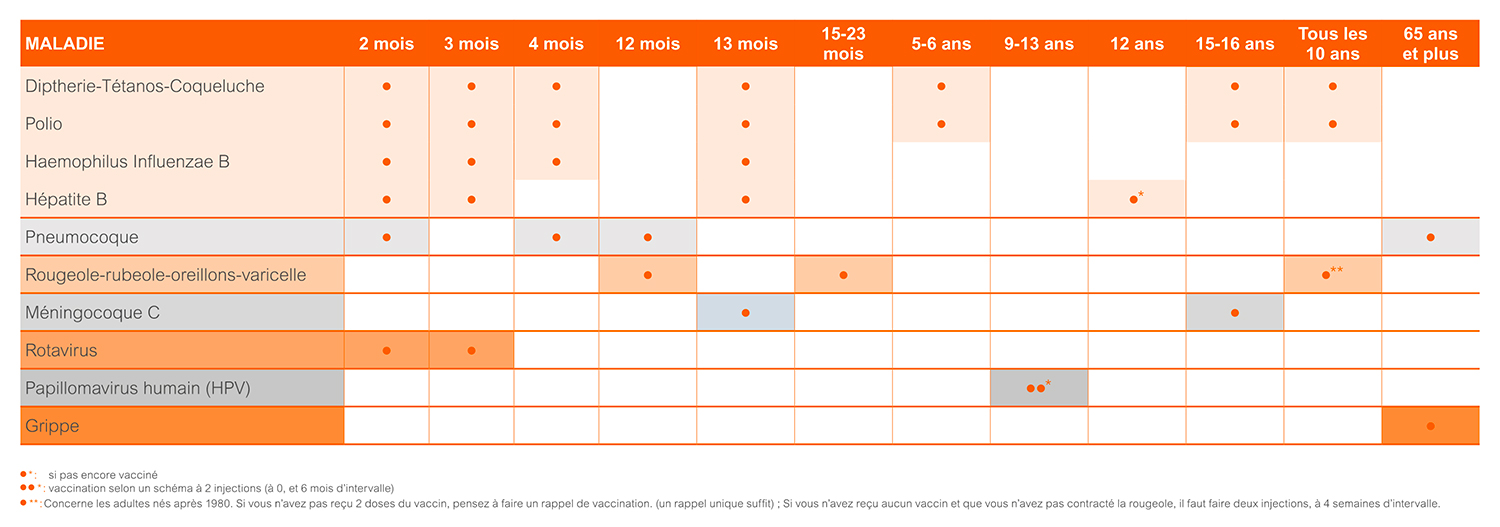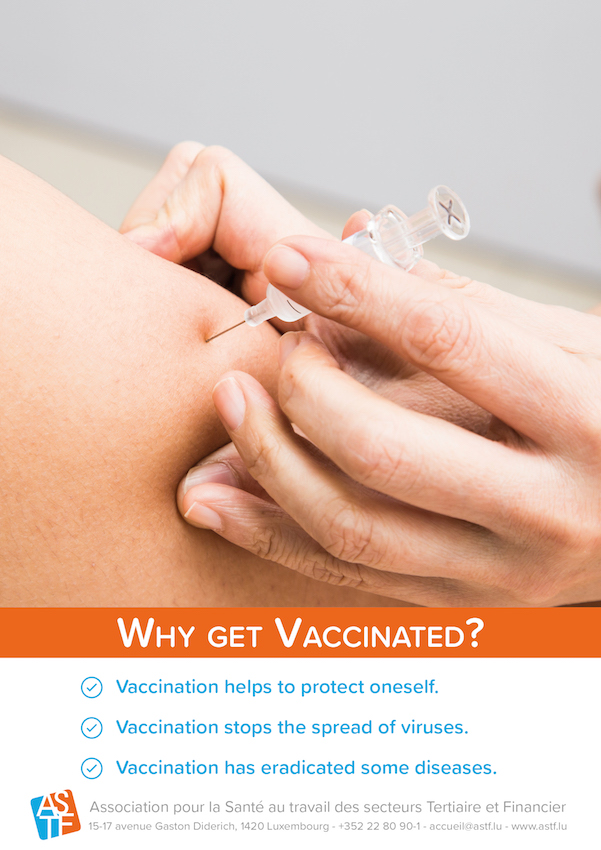Downloads
Vaccination
Protection of oneself and others
Vaccination consists of stimulating an immune response in the body by administering a harmless form of an infectious agent (bacteria or virus).
The immune system, having a form of memory, will be more effective and faster to defend the body when it comes into contact with a disease for which it has received the vaccine.
Why get vaccinated?
Thanks to routine vaccination, some diseases, such as smallpox, have been eliminated from the planet. Others, such as poliomyelitis, diphtheria, tetanus, pertussis, have almost disappeared from our countries. Haemophilus influenzae meningitistype ’b’ has become exceptional in countries where routine vaccination is respected.
Unfortunately, the arrival of some unvaccinated populations or the refusal of some parents to vaccinate their children weakens the protection of the population. Thus, outbreaks of measles and diphtheria have occurred in Eastern Europe and can spread if the entire population is not protected.
Vaccination therefore makes it possible to protect oneself, one’s family and friends, to avoid transmitting and spreading diseases, and to a large extent, can lead to the disappearance of a disease.
Vaccination remains useful when a disease has not been completely eradicated.
how to find one’s way?
There are recommendations for a systematic vaccination scheme in Luxembourg and neighbouring countries.
These recommendations are concerning the following diseases:
- Diphtheria
Disease caused by bacteria. It mainly affects the respiratory tract, which can cause asphyxiation or choking. This bacterium produces toxins that can also attack the nervous system or heart muscle.
- Tetanus
A disease caused by a bacterium present in the soil. It enters the body through a scratch, injury, splinter and can cause spasms, muscle contractions that can be fatal.
- Pertussis
A highly contagious bacterial disease causing an exhausting, long cough that can lead to complications such as bronchitis, otitis, pneumonia, convulsions, brain damage or even death.
- Poliomyelitis
A disease caused by a virus, which can cause, in severe form, a deformity of the affected limbs, muscle paralysis capable of leading to death if the respiratory muscles are affected.
- Haemophilus influenza B
A highly contagious disease caused by bacteria in the upper respiratory tract. EIt can cause a mild infection, such as ear infections, sinusitis, but can also cause pneumonia, meningitis, sepsis, joint inflammation, epiglottis (which can lead to choking), or permanent sequelae in relation to the infected site.
- Hepatitis B
A contagious disease caused by a virus that attacks the liver, which can lead to chronic hepatitis, cirrhosis or liver cancer. It is transmitted through blood, unprotected sex or from an infected mother-to-be to her child.
The vaccines against the 6 viruses above are combined in a single injection
- Pneumococcus
A highly contagious bacterium, transmission occurs through contact with an infected person or by air. It is responsible for various infections such as sinusitis, otitis, but also meningitis, pneumonia, septicaemia, which can be fatal or leave serious sequelae.
- Meningococcus
Bacteria present in the nose and throat, without giving any symptoms. It is transmitted through saliva, spittle or direct contact with an infected person. It can also be responsible for meningitis or septicaemia.
- Measles
Extremely contagious disease, caused by a virus that spreads through coughing or sneezing. It causes high fevers, a widespread rash, severe fatigue, severe cough. Possible complications are pneumonia, otitis, meningitis, encephalitis, which can cause incurable brain damage or death.
- Rubella
Highly contagious disease due to a virus. It spreads by air, like mumps and measles, and is also characterized by a rash. It is quite benign, except for pregnant women, as rubella can lead to death or severe malformations in the unborn child, especially during the first months of pregnancy.
- Mumps
Highly contagious disease due to a virus. It is responsible for the painful inflammation of the salivary and parotid glands (located on either side of the neck), accompanied by fever, headache and lack of appetite. This virus can also attack the pancreas, ovaries, testicles, cause complications such as sterility, meningitis, encephalitis, deafness, mastitis.
- Chickenpox
A highly contagious viral disease caused by a virus of the herpes family. It is characterized by an eruption of small pimples containing fluid (vesicles) on the skin and mucous membranes, accompanied by fever. It is transmitted by air or by contact with these vesicles. In addition to itching, chickenpox can cause complications, such as superinfections due to pimple scratching, lung or neurological damage, congenital malformations during contamination during the first months of pregnancy. Late in life, a person who has had chickenpox may develop herpes zoster (a rash of the same painful type along a nerve or lymph node, which can also affect the eye or ear).
The vaccines against the 4 viruses above are combined in a single injection
- Rotavirus
Virus responsible for gastroenteritis causing fever, diarrhoea, vomiting, which can lead to dehydration and therefore put young children or already weakened people at risk. A highly contagious disease, it is transmitted by direct or indirect contact with contaminated feces, but also by sharing toys, drinks with family or community members.
- Influenza
A highly contagious disease. It is characterized by the sudden appearance of high fevers, muscle aches and pains, intense fatigue, coughing, sneezing. It can cause severe pulmonary complications or even death in young children, pregnant women, the elderly or people weakened by chronic disease. As it is highly contagious, there is an epidemic each year in the fall/winter period, mainly in communities, institutions and high-traffic areas. It is transmitted by air, but also by contact with a contaminated object.
- Human papillomavirus has been added to the list of conventional vaccines.
HPV is a sexually transmitted infection responsible for genital infections that can lead to cervical cancer or cancer of the ENT sphere, vulva, vagina, anus and penis.
Some infections go unnoticed, others can cause genital warts or cancerous lesions. Papillomavirus infections are highly contagious, whether in men or women and are transmitted by sexual intercourse, intimate caresses or indirect contacts. A person remains contagious as long as the virus is present in his or her body.Vaccination of girls and boys from the age of 9 is recommended to reduce the transmission of this virus as much as possible.

Vaccination recommendations

Source : Ministry of Health - To download on sante.public.lu (in french only).
As shown in the table above, vaccinations are distributed according to a regularly updated schedule, starting at 2 months of life, to guarantee optimal immunity from the earliest age.
Some vaccines provide lifelong protection, others, such as the combined vaccine against diphtheria, tetanus, pertussis and polio, require a booster every 10 years to ensure optimal protection.
If you have any doubts about your vaccination protection, do not hesitate to ask your attending doctor or one of our doctors for advice during a visit to the ASTF, he or she can guide you and, if necessary, give you a booster of this vaccine on site.
Every year, influenza
 The influenza vaccine is the only one that is given every year, before the flu appears.
The influenza vaccine is the only one that is given every year, before the flu appears.
It is elaborated from the virus strains of the previous year, in order to optimize its effectiveness.
It should be noted that, every winter, influenza causes deaths, superinfections, complications, and absenteeism from work and school.
Routine vaccination coverage reduces its impact.
Each year, the ASTF organizes an influenza vaccination campaign for employees of member companies.
Vaccine orders were made between September 2 and 20, 2019 via rdv.astf.lu
The vaccination campaign will take place between 04 and 29 November 2019.
For more information contact accueil@astf.lu.

Vaccinations and travels abroad
Depending on the destination countries, the duration of the trip and the planned activities, vaccines against hepatitis A, hepatitis B (if not previously carried out), meningococcal meningitis (idem), typhoid, rabies, Japanese encephalitis, yellow fever, tick-borne encephalitis, malaria may be necessary.
Conclusion :
We don’t think about vaccination because we are in good health.
If we are in good health, it is also because of it.
Websites and useful references
Find this article in PDF and the poster ’vaccination’ to print for your premises.

